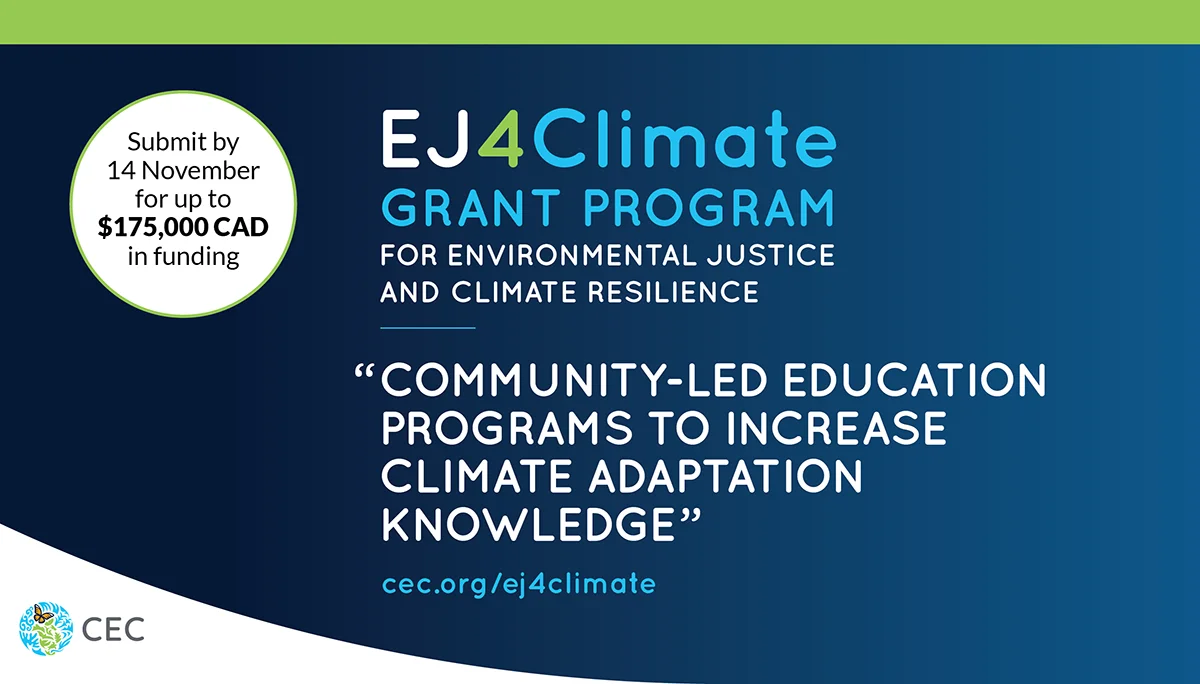EJ4Climate Grant Program Now Open: US$1.5M Available for Education, Environmental Justice, Climate Adaptation
Tiohtià:ke (Montreal), 26 September 2024—The Commission for Environmental Cooperation (CEC) is excited to announce that the fourth cycle of the US$1.5 million Environmental Justice for Climate (EJ4Climate) Grant Program is now open for applications for projects on “Community-led education programs to increase environmental justice and climate adaptation knowledge,” with up to C$175,000 in grant funding available for recipients.
Initiated by US Environmental Protection Agency (EPA) Administrator Michael S. Regan in 2021, the EJ4Climate Grant Program is dedicated to empowering underserved and vulnerable communities, and Indigenous communities, across North America, to help prepare them for climate-related impacts and to advance environmental justice.
The EJ4Climate Grant Program has been a driving force behind community-based organizations and individuals at the frontline of climate action, supporting solutions to adapt to the impacts of climate change. Since its inception, the program has received nearly 1000 submissions and awarded funding to 42 recipient projects to help communities in Canada, Mexico and the United States. For this grant cycle, the CEC is calling for project proposals that will integrate community-led education programs in support of environmental justice and climate adaptation.
Education, whether formal or informal, is crucial to advance environmental justice, especially in cases where community members are not aware of the injustices (or the causes and impacts of the injustices) they face and how to address them, because they lack access to information and knowledge. Community-led education programs can enable individuals to understand and analyze their problems and include a variety of perspectives in a learning-by-sharing approach. These programs can help community members transform their local knowledge into innovative actions or solutions and can lead to their active participation in decision-making. Education is also recognized as essential in addressing climate change and is a key element of climate adaptation, enhancing adaptive capacity and empowering people with the knowledge, skills and attitudes necessary to take action against climate change.
The EJ4Climate Grant Program welcomes proposals that promote the development of climate adaptation knowledge related to the following themes: extreme weather impacts, transition to clean energy sources, conservation or restoration initiatives, traditional ecological knowledge to address climate change impacts and/or food sovereignty. Proposed approaches may include, but are not limited to: hands-on activities, place-based learnings, community-science initiatives, knowledge exchange with Elders, training and capacity building, awareness campaigns, and engaging youth as agents of change. Successful projects will feature the active involvement and leadership of vulnerable and underserved communities and/or organizations serving these communities, in their design and implementation plans. Selected applicants will also have to demonstrate how they expect their project to have a direct and long-term impact on communities, their well-being and health, local environments and capacities to address and adapt to the impacts of climate change.
Proposals are due by 14 November 2024 and projects will be expected to begin in Spring 2025.
Learn more about the EJ4Climate program and selection criteria, view recipient projects and access the online application portal here.
For updates about CEC initiatives and news, sign up for our newsletter and follow us on social media.

About the CEC
The Commission for Environmental Cooperation (CEC) was established in 1994 by the governments of Canada, Mexico and the United States through the North American Agreement on Environmental Cooperation, a parallel environmental agreement to NAFTA. As of 2020, the CEC is recognized and maintained by the Environmental Cooperation Agreement, in parallel with the new Free Trade Agreement of North America. The CEC brings together a wide range of stakeholders, including the general public, Indigenous people, youth, nongovernmental organizations, academia, and the business sector, to seek solutions to protect North America’s shared environment while supporting sustainable development for the benefit of present and future generations
The CEC is governed and funded equally by the Government of Canada through Environment and Climate Change Canada, the Government of the United States of Mexico through the Secretaría de Medio Ambiente y Recursos Naturales, and the Government of the United States of America through the Environmental Protection Agency.